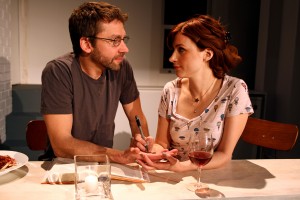
Everybody loves a love story. But Zoe Kazan doesn’t believe in happy endings.
Which is not to say she believes that love is just a passing cure for loneliness, a polite name for lust, or a subconscious exercise in narcissism. No, she seems to believe in the real deal: people really do fall in love.
It’s just that she doesn’t believe it’s going to end very well.
That seems to be the primary observation of her stark, bruising, oddly dispassionate (for a love story), smart, but joyless new play “Trudy and Max in Love,” now enjoying a first-rate production on South Coast Repertory’s Argyros Stage.
Trudy (the brilliant, preternaturally-centered Aya Cash), 28, and Max (the vibrant, excellent Michael Weston), 39, are habitues of present-day Brooklyn, where they meet in the Writer’s Room, a hangout in the ‘hood where locals pay for a quiet place to write (are there no libraries in Brooklyn anymore?).
Trudy is in the midst of a Young Adult sci-fi series (picked up already by the movies) and Max recently wrote a “serious” bestselling novel.
(Does Kazan self-consciously plant them in the success column of the New York City artsy scene to create a plausible set-up, perhaps, for all their brainy chatter? This backfires. Their enviable careers make it hard to feel too much pity for their chronic malcontentedness. Or is Kazan making a broader point: that no one seems to know how to enjoy success anymore?)
They flirt audaciously. He plays the Aww-Shucks Emo Guy; she employs an insulting, nihilistic tone that passes nowadays for adorable. But Max is a sucker for being dressed down, and he is instantly smitten. He’s man who, thanks to a vaguely sketched dysfunctional childhood, thought he didn’t know how to love. But this girl, he’s convinced, is his own Real Deal at last.
She is smitten too. In a long string of relentlessly linear, overwritten scenettes (has no one told Kazan she’s actually written an indie screenplay?), we follow them from coffee, to wine, to an art opening, and – finally! – to bed.
But this is no carefree affair. She is married. To her credit, she never made a secret of it, and she has hinted – just enough to give Max hope — that she could, maybe, leave her husband, liberating Max and Trudy to be together, for real and forever.
It is here, finally, that the story comes up against a genuinely charged dramatic dilemma. Trudy now loves two men. She has already betrayed her husband, but to leave Max and return to him is, now, thus, another betrayal. Max, meanwhile, has for the first time in his life fully engaged his heart. To lose her could destroy him (or so he ardently believes.) But can he be party to destroying a marriage?
Trudy, (in a gender-reversal from what pop culture would lead us to expect) turns out to be the cooler head. She thinks that love – real love – can be a choice, not just an emotional tsunami in the face of which we are helpless victims. But Max, poor schnook, is simply head over heels, a goner.
No spoiler here about how it all turns out. Suffice to say there is no happy ending. Kazan seems to be telling us that post-millenial romance is as confusing, difficult and heartbreaking as ever, even with the so-called liberation of the sexual revolution 50 years under our belts.
It’s a play that offers no easy answers because there aren’t any. That is honest and good. But we already knew that. And it makes, alas, for a play that’s hard to fall in love with.
“Trudy and Max in Love” runs through January 26. Tickets start at $22. Call (714) 708-5556 or visit SCR.org.




